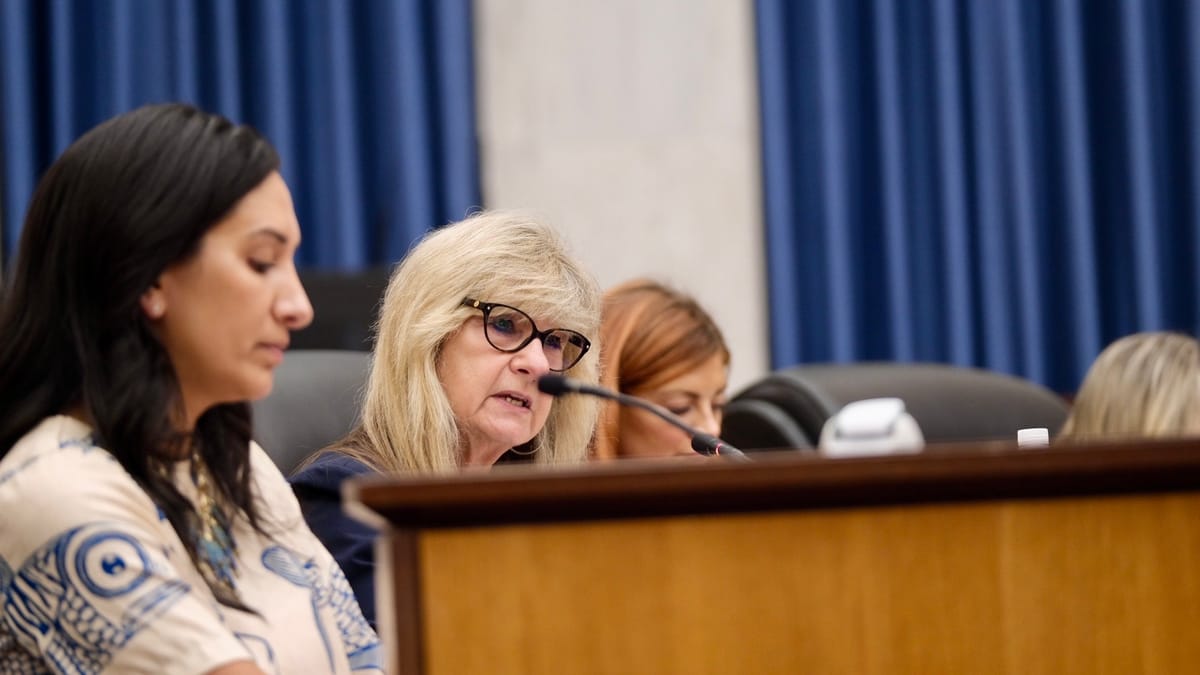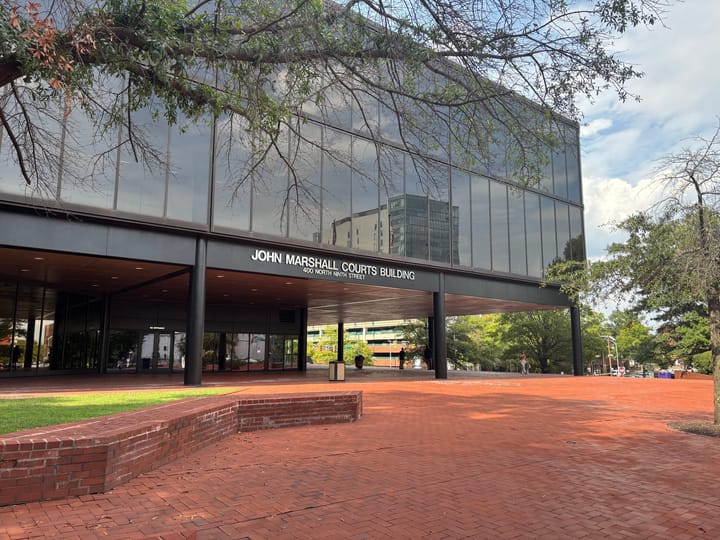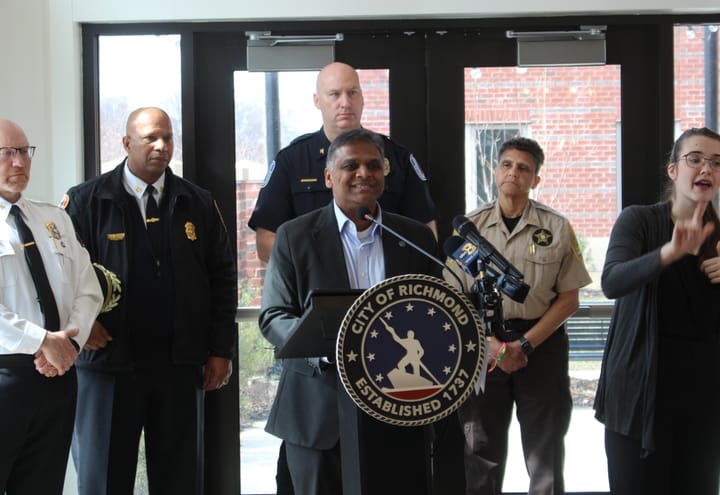Siding with Avula, Council rejects push to lower real estate tax bills

The Richmond City Council voted Tuesday to keep the city’s real estate tax rate unchanged, a decision that will mean higher tax bills for homeowners but avoids spending cuts to the city budget.
The 6-2-1 vote was to keep the property tax rate at $1.20 per $100 of assessed value. A competing proposal to lower the rate to $1.16 was rejected at the same meeting, drawing support from just three Council members.
The proposed reduction would have knocked a few hundred dollars off a typical homeowner’s tax bill while forcing the city to forgo about $17.2 million in expected tax revenue.
Mayor Danny Avula’s administration opposed the tax relief proposal and supported keeping the tax rate at $1.20, the same rate the city has had since 2008.
Even without the rate changing, tax bills in Richmond have gone up significantly for many homeowners due to rapid increases in the assessed values of their properties.
That’s creating a growing divide among city policymakers about whether the city should keep collecting extra tax revenue to fund its growing budget or start to think seriously about lightening the tax burden on residents.
“I would not be able to vote to reduce the real estate tax rate at this time, but look forward to us doing our due diligence to get to a place where we would have that kind of discussion,” said Council President Cynthia Newbille, who opposed the tax relief proposal.
The Council was legally required to re-approve the tax rate due to a Virginia law that requires local governments to at least consider shielding residents from higher tax bills when property values increase significantly. In new assessments that went out last month, property values rose by 5.74% overall, triggering a disclosure rule requiring the city to notify residents they will effectively be hit with a tax increase even if local leaders aren’t making it obvious.
Avula and his team have argued an across-the-board tax rate reduction would disproportionately benefit owners of the city’s most expensive properties and strain the city’s finances as government costs continue to rise. The mayor has also urged budgetary caution due to the upcoming assessment freeze, when the city will skip a cycle of reassessing property values in order to sync up its fiscal calendar. That will temporarily give the city less revenue growth to absorb extra costs.
The budget the Council approved in the spring was built around a $1.20 rate, and several Council members said the city is facing too much uncertainty to risk changing course in the middle of a budget year.
“I made a choice when I voted for the budget,” said Councilor Nicole Jones (9th District), who supported maintaining the $1.20 rate. “And I’m just going to be clear about that.”
Richmond Public Schools Superintendent Jason Kamras spoke on his own behalf at Tuesday’s meeting, saying that a lower tax rate would “almost inevitably mean a reduction in funding for RPS.” As the city has budgeted more for public schools over the last several years, Kamras said, there have been corresponding improvements in test scores and graduation rates.
“Those successes are inextricably linked to the investments that this city has made in our children and RPS,” Kamras said.
In a memo to the City Council last week, the Avula administration said lowering the tax rate by 4 cents in response to rising assessments could be a “potentially catastrophic” decision due to the loss of $17.2 million. However, the city’s general fund budget was projected to grow by $55 million this year, which means tax revenue would still be growing even if the Council lowered the rate.
By the city’s own published numbers, the decision was between 5.5% year-over-year budget growth, or 3.7% growth with the slightly lower tax rate that wouldn’t completely offset the tax increases many Richmonders are seeing.
Supporters of lowering the rate say the rising cost of living in Richmond is squeezing many residents out of the city and making Richmond increasingly unaffordable for those with modest incomes. In light of that, the tax relief proponents argue City Hall has to start getting its own spending under control and look seriously at giving taxpayers a break.
Councilors Reva Trammell (8th District), Sarah Abubaker (4th District) and Stephanie Lynch (5th District) were the three members who supported lowering the tax rate. Lynch ultimately voted for the tax rate that passed even though she argued city officials have to figure out how to “budget within our means.”
Trammell, who has pushed for lowering the tax rate for several years, seemed unsurprised but frustrated by Tuesday’s outcome.
“I think it’s a damn shame,” Trammell said. “I hope the citizens blame every one of us that’s sitting up here.”
Abubaker said the double-digit increases in assessments have put far too much strain on homeowners. Despite city leaders’ concerns about “rent gouging” by landlords, she argued, the city’s own actions are also spiking housing costs.
“The city’s just a rent gouger as well,” she said. “Truly.”
Councilor Kenya Gibson (3rd District) abstained from the vote. She asked Tuesday that the decision be delayed so the Council could gather more information about the city’s finances, particularly the size of the surplus the city has from the budget year that ended June 30.
When the Council makes decisions on how much to tax residents, Gibson said, there should be more clarity on how much money is truly needed to fund city services.
“As a person who believes in transparency, without having necessary information to complete my homework assignment, I would feel like a fraud,” Gibson said.
The Avula administration has indicated it will provide the Council with surplus information eventually, but did not before Tuesday’s vote. Asked by The Richmonder why the number was unavailable, the mayor said his new team is still working through the process of finalizing last year’s books. But he added that — going forward — he would support efforts to make the surplus figure available sooner.
In the final year of former Mayor Levar Stoney’s time in office, the Stoney administration similarly opposed efforts to lower the city’s tax rate. Stoney proposed using some of the surplus money left over from fiscal year 2024 on targeted relief programs meant to help Richmonders struggling to afford housing.
One of those initiatives — the Gap Grant Program — was meant to provide up to $1,200 in direct housing assistance to residents struggling with rent or mortgage payments who met certain eligibility criteria.
In lieu of cutting the tax rate, the Council approved that program and set aside $3.9 million in surplus funds to pay for it.
As of late September, according to recently published data, the city had only distributed a little more than $20,000 after receiving more than 2,300 applications. Officials have indicated they’re trying to work through an application backlog, but the data shows the vast majority of the $3.9 has not been used to provide housing relief for needy Richmonders.
Contact Reporter Graham Moomaw at gmoomaw@richmonder.org
The Richmonder is powered by your donations. For just $9.99 a month, you can join the 1,200+ donors who are keeping quality local news alive in Richmond.






